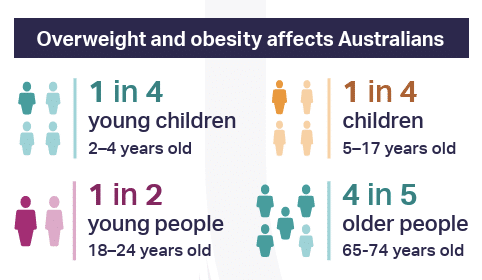The cost of obesity
Economic and social cost to the individual
People who are overweight or obese suffer considerable economic and social costs.
Social stigma
Overweight people are more likely than normal weight people to suffer from bullying, teasing, and discrimination. this can impact their quality of life and mental wellbeing, and depression is more common among overweight people.
Stereotyping and stigma are common place and this can affect the way people are treated in health care and social settings.
health costs
Excess weight carries with it increased risk of illness and health issues. This means additional costs for the individual as they seek acare for these conditions which can also include mental health services.
There are also additional costs from lost employment due to illness or loss of employment.
Academic performance
Academic performance is lower in children and adolescents who are overweight or obese. This affects them socially but also economcally down the line.
https://www.aihw.gov.au/reports/overweight-obesity/overweight-obesity-australian-children-adolescents/summary
https://www.phrp.com.au/issues/october-2022-volume-32-issue-3/weight-stigma-in-australia/
Economic and social cost to society
There is a significant social and economic cost to society due to obesity and excess weight.
The estimated total cost to the economy is estimated at $39 billion AUD, (1.9% of GDP) in 2019. This cost is predicted to rise to over $62 billion by 2030. This cost is made up of direct cost to healthcare such as obesity management and comorbidities of weight gain, and also economic costs related to workforce participation due to time of work and lowered performance. Other economic costs are related to reduced quality of life and stigmatisation.
Examples of this cost include:
- Treatment of diseases such as type II diabetes, cardiovascular disease, and cancers related to obesity.
- Obesity results in higher rates of everyday illness and mental health causing lowered performance and participation at work.
- Reduced volunteership due to fatigue and/or illness, or mental health also has an economic cost on society.
- Flow on effects to friends and family of time and care for obese loved ones who may be incapacitated due to their weight.
It is acknowledged that prevention of weight gain is more economically sustainable.
Social costs also include additional:
- strain on social, health, and mental health services.
- strain on friends, family, coworkers.
- stigma and discrimination of whole sectors of people with obesity.
- obesity has a social contagion aspect, and can spread through groups and further impact costs.
https://www.obesityevidencehub.org.au/collections/impacts/cost-impacts-of-obesity-and-of-obesity-prevention-measures
https://hms.harvard.edu/news/obesity-spreads-through-social-networks
Some more stats
66% of adults aged 18 and over were living with overweight or obesity.
Obese people have an 18% increased risk of being depressed.
In 2018, being overweight (including obesity) was responsible for:
-
55% of type 2 diabetes disease burden
- 51% of hypertensive heart disease burden
- 49% of uterine cancer burden
- 43% of gout burden
- 42% of chronic kidney disease burden (AIHW 2021).
High body mass contributed 8.4% of all disease and injury burden in 2018
https://www.abs.gov.au/articles/neighbourhood-impacts-health

